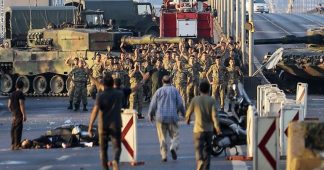Senate Committee Looks To Revive Cold-War Era Body To Catch Russian Spies
By Ali Watkins
A new intelligence bill also proposes tightening how Russian diplomats can travel.
Congress is pushing the White House to revive a Cold War-era committee to crack down on Russian spies, underscoring just how uneasy Washington is about its adversaries in Moscow.
In its 2017 Intelligence Authorization Bill, the Senate Intelligence Committee is asking the White House to reinstate a presidentially-appointed group to unmask Russian spies and uncover Russian-sponsored assassinations. The group, which would include personnel from the State Department, intelligence community and several other executive offices, would meet monthly. Along with spies and covert killings, the committee would also investigate the funding of front groups — or cover organizations for Russian operations — “covert broadcasting, media manipulation” and secret funding.
A similar interagency body called the “Active Measures Working Group” existed during the Cold War, but it hasn’t been active in decades. This new group would be modeled after its Cold War predecessor, one U.S. intelligence official said on condition of anonymity to discuss the sensitive bill.
The intelligence bill passed through the Senate committee in May, and now must be passed by the full Senate.
It would also require the FBI to investigate all requests by U.S.-based Russian diplomats to travel 50 miles outside his or her official post to ensure those diplomats have properly notified the U.S. Government of their travel plans. No Russian diplomats could travel outside of that 50 mile perimeter unless all of their colleagues have followed travel rules in the three months prior. The FBI would also be required to notify Congress that the Russians have followed the rules before the travel is cleared by the State Department. The purpose is to ensure the Russians are following proper protocol in their travel.
“As a general rule members of foreign embassies and consular posts are permitted to travel freely around the United States,” Pooja Jhunjhunwala, a State Department spokesperson, said. Depending on circumstance, Jhunjhunwala said, other restrictions can be put in place.
The new provision comes after Russian diplomats have been found to be bending rules that require them to notify the State Department if they planned to travel outside of their immediate posting, the U.S. intelligence official said.
“The Russians tend to notify State Department at 5pm on a Friday that they’re planning to go outside their 50 mile radius, and State Department doesn’t want to be the bad guy [and say no],” said the official. In many cases, the official said, the FBI doesn’t have enough time to decide whether they should further investigate the Russian’s travel plans, and it puts the US at a disadvantage.
“We don’t have the kind of manpower the Russians do, to run 24/7 tails on everyone,” the official said. “I don’t think a diplomat’s secretary could leave the [U.S.] embassy [over there] without being followed.”
The FBI declined to comment. The Russian embassy could not be reached for comment.
The Russian Ministry of Foreign Affairs threatened to strike back if the measure goes through, tweeting “If the movement of Russian diplomats is restricted in the US, we will take reciprocal action against US diplomats in Russia.”
The new proposed measures show U.S. worries over Russian spies in its midst are at a fever pitch, reaching a level not seen since the Cold War. Six years since an FBIsting netted 11 Russian operatives spread throughout the country, Washington is increasingly unsettled over where — not “if” — Moscow is lurking.
Previous intelligence authorization bills have hinted at concerns over Russia’s covert capabilities. For example, the committee’s 2015 Intelligence Authorization Billrequired defensive measures be taken overseas and “secure spaces” be built into any diplomatic facility in “the Russian Federation, (or) any country that shares a land border with the Russian Federation, or any country that is a former member of the Soviet Union.” That same bill further required that U.S. diplomatic facilities in Russia move away from employing locals.
But there is no subtlety in this year’s bill. There’s a new sense of urgency to the Russian threat — a dynamic adversary that Washington’s own spooks have quietly worried is consistently overshadowed by the more kinetic Middle East threat environment.
In a bill riddled with talk of cyber threats and tech, the language on Russia suggests far more primitive concerns, hearkening to the old school, Bond-esque espionage that thrived during the Cold War.
The Senate’s specific focus on diplomatic personnel indicate a burgeoning concern over human intelligence, or as it’s colloquially referred to, “HUMINT.” Both in the Cold War-era and now, embassies and diplomatic facilities are ground zero for human-focused spy operations. During the height of the Cold War, foreign agents were routinely run out of embassies, and spy agencies often had secret offices or personnel based within those facilities. Case officers were — and still are— routinely given cover as diplomatic officials in the adversary’s country, which protects them from prosecution.
One of the U.S.’s most prized Cold War assets, a Russian military engineer named Adolf Tolkachev, was run by several case officers out of the US embassy in Moscow. For six years, Tolkachev passed information to his operators at the embassy on Russian airplane radars before his identity was revealed to the KGB and he was executed in Russia in 1986. In another human twist, he’s believed to have been given up by Edward Lee Howard, a disgruntled former CIA agent who eventually defected to Moscow.
The vote to pass the full Intelligence Authorization bill has not yet been scheduled, but will likely be pushed through before the Senate recesses for a long-than-usual summer break in July.
“We have to follow their rules over there, and we want to make sure they do the same here,” the intelligence official said.











